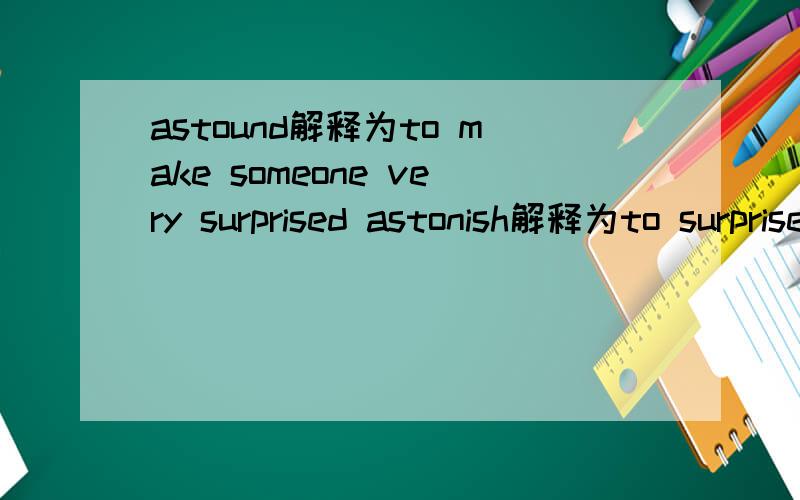astound解释为to make someone very surprised astonish解释为to surprise someone very much 请问这两者的程度是一样的吗?还是有轻重之分?
来源:学生作业帮助网 编辑:作业帮 时间:2024/11/16 09:38:30

astound解释为to make someone very surprised astonish解释为to surprise someone very much 请问这两者的程度是一样的吗?还是有轻重之分?
astound解释为to make someone very surprised astonish解释为to surprise someone very much 请问
这两者的程度是一样的吗?还是有轻重之分?
astound解释为to make someone very surprised astonish解释为to surprise someone very much 请问这两者的程度是一样的吗?还是有轻重之分?
以下是我学习时候总结的,加上了“amaze”,请参考:
astonish,amaze,astound:These verbs mean to affect a person strongly as being unexpected or unusual; 这些动词意思是因其出其不意或不寻常而强烈地影响一个人.作为动词在一起比较的一般含义是“使吃惊”.
astonish:Astonish suggests overwhelming surprise; 表示难以抵御的惊讶.表示“使人大吃一惊”、“几乎无法使人相信”,但没有“惊叹”的意思.就是说,通常表示某事使人震惊得难以置信.它一般以事物或他人作主语,而以本人作主语时用被动形式.
1.The sight of such an enormous crowd astonished us.看到如此庞大的人群我惊讶万分.
2.The successful laying of the Atlantic cable astonished everybody:its later breaks astonished no one; but after it was finally in operation.Many said that no future invention could surprise them.在大西洋底下成功地铺设了电缆,这使得大家都感到骇然;后来有几处电缆折断了,谁也不感到惊奇.不过在这些电缆终于投入工作之后,许多人都说,未来的任何发明再也不会使人吃惊了.
3.I was astonished at his rudeness.他的粗野使我大吃一惊.
4.He was astonished at what he found.A man was lying in the box on top of a pile of woolen goods.他所看到的使他大为震惊,箱子里的一堆毛织品上面躺着一个人.
amaze:Amaze implies astonishment and often bewilderment; 表示极度惊讶以及困惑.所表示的吃惊中包含着使人迷惑不解、困窘或惊疑不定.强调“使惊异,困惑”间或还有“惊叹,佩服”的意思,是意义很强的词.它一般以事物或他人作主语,而以本人作主语时用被动形式.
1.The violinist's virtuosity has amazed audiences all over the world.小提琴家的精湛技艺使全世界的观众惊诧不已.
2.We were amazed at the ingenuity with which they solved their difficulties.他们在解决困难中所表现的智慧使我们惊叹[佩服].
3.When the archaeologists reconstructed the fragments,they were amazed to find that the goddess turned out to be a very modern-looking woman 当考古学家把那些碎块拼起来的时候,他们惊诧地发现那女神原来是一个现代装束的妇女.
4.Scientists have been amazed to find that it can cut through the hardest rock with great ease.科学家惊诧地发现,它可以轻而易举地钻穿最坚硬的岩石.
astound:Astound connotes shock,as from something unprecedented in one's experience; 暗指由于未经历过的事情产生的震惊.比 astonish 的词义强得多,常用于表示某件事你虽然认为有可能,但与你所发现的实际情况之间有很大差距.
1.He was astounded when he heard his son had taken drugs.他听说他儿子吸毒,不禁大为惊讶.
2.We were astounded at the high cost of traveling in Japan.日本昂贵的旅游费用令我们震惊.
3.The police were astounded when Mrs.Ramsay told them what she had done.当莱姆赛夫人把自己所做的事告诉了警察时,他们为之骇然.
虽然surprise可以当及物动词
但是貌似没有人说to surprise someone very much这样的表达...不太常用